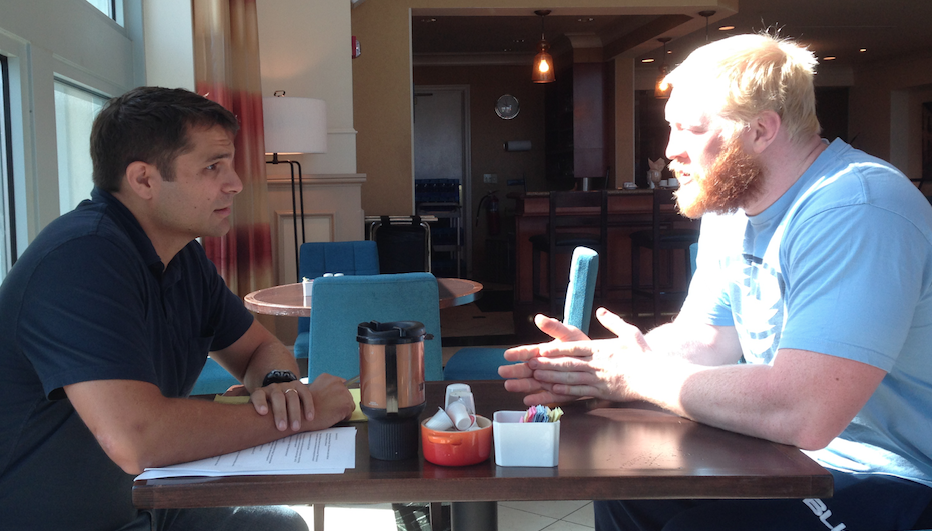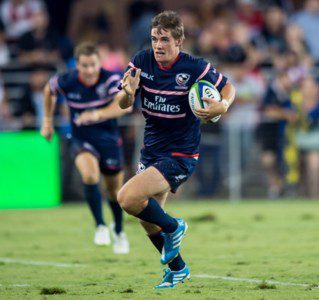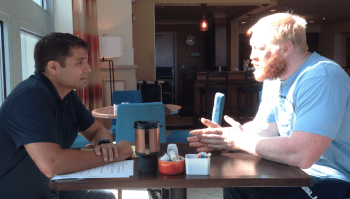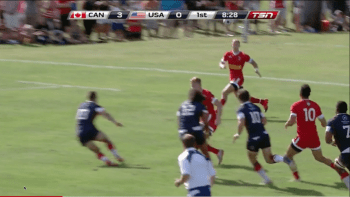
PHILADELPHIA, PA – AJ MacGinty and Eric Fry represent two ends of the USA Eagles’ player pool. One was born and raised overseas and only just became eligible to play for the USA. The other was born and raised here in the US, but went overseas to develop as a player. Unless there are a lot of changes between now and the 2019 World Cup, the Eagles are going to need more players following similar paths.
I spoke with both of them, about their paths and other things, in the lead up to the August 30th match against Harlequins.
The MacGinty Path is the residency path. The Eagles have had plenty of players over the years who develop elsewhere but who qualify to play for the USA via their own or parent/grandparent’s citizenship. MacGinty, though, is doing the same thing that, say, Nathan Hughes is doing: choosing a club and national setup that will give him a chance to compete and succeed.
In terms of playing for the Eagles, it was his father who first suggested MacGinty might be able to when he was deciding whether or not to head to Life University after eight months in New York. MacGinty said, “I just didn’t think that would ever come about.” He then also admitted, “I did have it in the back of my mind.”
When the USA Selects were training at Life, MacGinty had the chance to play in a scrimmage and show he could compete. “After those matches there was a bit of chat,” from coaches, that “you’re going in the right direction. Keep working on your strength and conditioning and there’ll be an opportunity for you when you become eligible.”
When speaking of his time at Life, MacGinty spoke well of facilities and coaches and the knowledge and feedback they provided.
When asked about getting more young, talented players following his route, MacGinty mentioned that he imagined lots of players would like to come to America as part of their university experience, but the cost of college is too high here for most.
The biggest challenge of the MacGinty Path, the residency path, is proving to young players that they can both develop while establishing residency and also have professional opportunities after they’ve been capped. MacGinty is evidence of the first part, but, “I’ve got nothing set up for after the World Cup. Obviously, I’d love to put in some really good performances and attract a bit of attention and hopefully play professionally somewhere.” There seems a real chance of that, but nothing is certain.
The Fry Path is someone who gets into the Eagles’ squad, or at least onto the fringe, but then must take a leap overseas and hope to find the right conditions that allow him to really improve as a player. This path involves a lot of risk, a lot of work, and some luck.
 For Fry, that meant going to Wellington, New Zealand, getting a contract with Manawatu, then to London Scottish, and then to the Newcastle Falcons.
For Fry, that meant going to Wellington, New Zealand, getting a contract with Manawatu, then to London Scottish, and then to the Newcastle Falcons.
His biggest moment of risk has likely passed. When he travelled to New Zealand, he was looking to get into a “rugby environment,” and he had encouragement and help from Dave Hodges in making some initial connections. Still, Fry sees it as, “I was lucky to pick up that Manawatu contract.” A player can be talented and have the necessary attitude, but “It is all a gamble.” He also mentioned the security that having some money saved up before he went allowed him.
I asked Fry if the Eagles can consistently challenge Tier I nations if players need to continue to set out on odysseys like his. “Until there’s a change, I think we’re going to struggle.”
Fry this season also saw his playing time influenced by not only his performance, but also his passport. The Aviva Premiership rules limit the number of foreign player in a gameday squad, so some selection decisions were about more than performance. Having recently acquired a European Union citizenship (his grandfather was born in Germany), next season Fry will be a non-English Qualified Player, which is a category with more flexibility.
As the season went on with Newcastle, Fry saw more playing time. “Coming up from the Championship is a big step. It took me a while to find my bearings.” He did get into a rhythm at the end of the season and feels the season clearly benefitted him as a player.
“My scrums at times have been questionable, especially on the tight head side, so I try to make up for that by my work rate around the park. The Premiership season is really long. You get to that high level of fitness and then you have to maintain it the whole length….I think my fitness was very good by the end of the season, I was getting a lot of great scrum coaching, so that helped out a lot.”
That is the big payoff of the Fry Path. He has landed at a club where he is improving. He is giving the club value as a player, and he is getting value from the experience.
Canada and Other Thoughts

MacGinty was pretty candid about his performance so far. “There is still a lot to work on, even in that last game when we got a win against Canada—still came off pretty frustrated with how the game went and some individual skills I didn’t do so well.” On defense, “We gave them too much space in the first half.” From an early scrum inside their 22, “They got outside us and gained a lot of ground.” He thought he made it hard on the centers with how tight he was standing “If I start tight, then they have to obviously start tight with me…It’s not nice for your forwards to come out of a scrum and see the ball 40 meters behind them.” “[We] took a step backward” on defense, relative to Japan and earlier Canada match.
An important goal for Sunday’s match, according to MacGinty, is for things to be “smooth running” with the expanded game day squad and more substitutions. “We don’t want the standard to drop when there’s a lot of changes.”
He seemed excited that, likely, “They’re going to run the ball a lot and that is going to give us a chance to work on our defense.”
Fry on the difference between this summer and last summer: “I definitely recognized the very first week we were in camp in Santa Clara there was just an extra energy.” Maybe because it was a World Cup year, “or just a different makeup of guys. We had some of the sevens boys back involved who haven’t been around for a while, and it seemed like there were a lot of young guys involved now which is really nice, and maybe there was that youthful energy there. Definitely a different buzz…and it reflects in the results. We lost to Samoa but it was close. We felt like if we had done a couple of things differently we could have won that game. [We] picked up the Japan win playing quite well. Good vibe. Good game. Good results. It reinforces itself.”
The emergence of Titi Lamositele at tighthead “does help. I’ll always play where I’m needed” but for his clubs he is “primarily a loosehead and you get used to scrumming on one side.” I mentioned a Newcastle v Harlequins game in which he scrummaged quite well and asked if we can expect more of that on Sunday. “I think so. We’ve been doing some good work here. We have a good culture.” Everyone wants the starting spot but “everybody has the desire to get the team better. [Forwards Coach Justin Fitzpatrick] and some of the other boys have been pointing out some technical things with me and when I was able to put it into play in the Canada game—didn’t get them all right—but it came through.”
“There is [more time spent on scrummaging in training this year]. There has been a transition. Our philosophy before was a very machine-based training and now we’ve changed to a more live-based. We’re not doing massive amounts of 8-on-8, but we’re doing a lot of profile work with bungee cords which really highlight if you have poor pushing position and then we’re doing some smaller group-based stuff, like 3-on-3, 4-on-3. And I think that’s added a bit.”
“Before, we probably leaned too heavily on the machine and not enough live and we’ve switched that and I think that is a big reason why we’ve been doing so well”
About Samu Manoa, Fry said, “I’d probably start him in the back row. In the past, we’ve moved him to the second row more for scrummaging reasons…but I think our scrum has been solid right now and don’t see that as much as a priority and I think he’s dangerous off the base, dangerous as an 8. And the fact that he is doing less pushing in the scrums means he’ll be fresher around the park to get those big carries and those big tackles.”
About Todd Clever: “He’s a good friend, a good player. It’s too bad he’s not here. With where we are now, none of that [talking about his dismissal] is very helpful…We’re just going to get on with playing.”
Fry thinks the Eagles have a real chance to advance out of their World Cup pool. “We’ve shown how we played against Samoa, a close game. If we fix a couple things that we’ve been fixing, then that is our game. We’ve shown we can beat Japan. I think we can do it again. Two [wins] might be enough. Scotland is also a vulnerable side. I think we could have them. Our chances are looking better than they have in the past world cups.”
That’s it… Feel free to comment below, look for and “Like” our Facebook Rugby Wrap Up Page and follow us on Twitter@: RugbyWrapUp, Jake Frechette, Junoir Blaber, James Harrington, Jamie Wall, Nick Hall, DJ Eberle, Scheenagh Harrington, Jamie Loyd, Cody Kuxmann, Karen Ritter, Audrey Youn, Akweley Okine, Rocky Brown and Declan Yeats, respectively.

